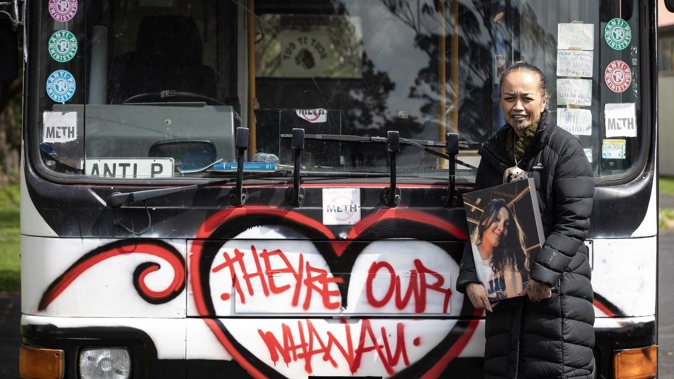
A hīkoi has begun from Northland to Parliament to oppose National and ACT’s gang policies and highlight the impact they could have on the whānau of gang members.
The 10-person strong trip, led by Matilda Kahotea (Ngāti Pūkenga), is stopping off at marae and gang houses along the way to explain the policies, get signatures for a petition and to encourage people to vote.
Kahotea told the Herald they feel the policies are ill-informed and they want to be included in solutions that are made for them.
“They have no idea about how we live, what actually we have to offer within our healing spaces for our people and we feel like not enough has been put into this environment to make some real positive decisions.”
National’s proposed gang policies include making gang membership an aggravating factor at sentencing, with the intention that convicted gang members would face “tougher consequences” for their crimes.
As well as this, the party would ban gang patches in public places and boost police powers to enable warrantless searches to find guns held by gang members, to prevent some gang members from communicating and to restrict their public meetings.
Kahotea said family connections are a lifeline, and stopping gang members from associating severs ties within whānau.
“We are already feeling that already, you know, the men are getting incarcerated away and our families and our mothers and their kids are being left to tend to themselves.
“A lot of our people aren’t even allowed to return home. These are family members that get out of jail and they’ve been banned from going back to their whenua, their homelands.
Ione Andreassend, left, and Matilda Kahotea inside the bus. Photo / Jason Oxenham
If the proposed policies were passed, she said their people would not be able to gather for tangihanga, births, birthdays or even school events.
Paula Ormsby, who is supporting Kahotea, told the Herald they are opposed to the prohibition of insignia and dispersal notices and said the non-association policy would tear families apart.
“Māori are overrepresented in every sector in the justice system and yet they want to give the police further powers to be able to act.”
National Party Corrections spokesperson Mark Mitchell said he would be open to speaking with the group and if the hīkoi arrives at Parliament, they will meet them there.
He said National will support and help any gang member, especially those with families, to leave the gang.
However, Mitchell told the Herald life will become “very, very difficult” for those who remain in gangs.
On whether National’s gang association policy would sever families, Mitchell said he “completely rejects” the claim.
Matilda Kahotea, holding a portrait of her late grand-daughter Jacinda Luaki, is leading a hīkoi on a bus from Northland to Parliament in opposition to National and Act’s proposed gang policies. Photo / Jason Oxenham
ACT wants to introduce Gang Control Orders to crack down on gang members and increase the power police have to seize assets of members found with illegal firearms.
Both parties would use the National Gang List to implement the policies. The list has been criticised for its limitations, with gang expert Dr Jarrod Gilbert telling RNZ in 2021 the list could be “double the reality”.
ACT leader David Seymour said he is open to speaking to anyone and said the group live in a country where they are free to travel around.
“ACTs policies don’t actually make it illegal to be a gang, some people think that we should have such policies. Our policies make it illegal to break the law and particularly to deal drugs, have illegal firearms or be coerced into joining gangs.”
Kahotea told the Herald they are stopping in nine places, which have a high prevalence of gang members, and are staying at marae that have offered to house them.
“We’ve called ahead to all the police, all the police units where we are going, who have been awesome. The Māori liason police officers have been staying in touch with us and us them, keeping them up to date on our movements, what it’s looking like, if we need their help.”
A spokesperson for the police said the organisers were promoting a peaceful hīkoi and said they are monitoring the situation.
Kahotea said the reason why gang families are going on the trip is to show the policies impact women.
“This is whānau focused, they think these laws and legislations are just focused on the patch and the guy inside of it. No, no, no, we come with it.”
Once they arrive at parliament, Kahotea hopes they are able to have a kōrero about the policies.
Katie Harris is an Auckland-based journalist who covers social issues including sexual assault, workplace misconduct, crime and justice. She joined the Herald in 2020.
Take your Radio, Podcasts and Music with you

/cloudfront-ap-southeast-2.images.arcpublishing.com/nzme/TCWGJ6EKXFEVFBHFW5P3WZ2HVQ.JPG)
/cloudfront-ap-southeast-2.images.arcpublishing.com/nzme/FPTADDDY5VDCVMG6EMH6BSBY6A.JPG)








